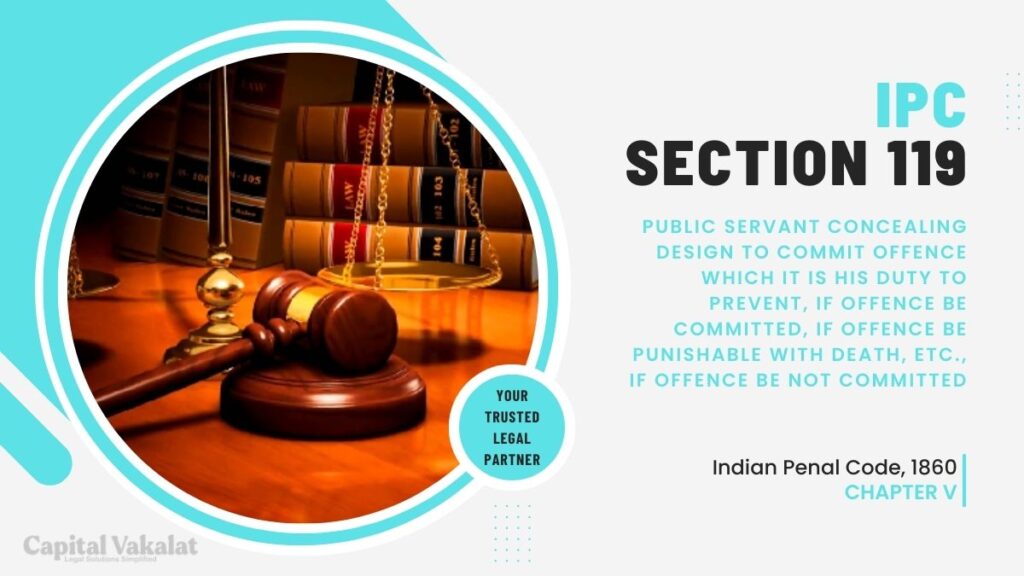Public servants play a pivotal role in maintaining law and order within a society. Their responsibilities are not limited to enforcing laws but also encompass preventing crimes and ensuring the safety of the public. Section 119 of the Indian Penal Code (IPC) addresses the legal aspects related to public servants who conceal a design to commit an offense which falls under their jurisdiction, especially if the offense is punishable by death, or even if the offense does not ultimately occur.

Introduction to Section 119 IPC
Section 119 of the IPC deals with a scenario where a public servant, entrusted with maintaining the rule of law, conceals any design to commit an offense within their jurisdiction. It is considered a grave offense because it involves a breach of the public’s trust and duty to uphold the law.
Understanding the Role of a Public Servant
Before delving deeper into the implications of Section 119 IPC, it’s crucial to understand the role of a public servant. Public servants include government officials, law enforcement officers, and civil servants who hold the responsibility of safeguarding the interests of the public and upholding the law.
Duty to Prevent Offenses
Public servants are not just enforcers of the law; they are also obligated to prevent offenses from occurring within their purview. This duty includes taking proactive measures to ensure the safety and security of the public.
Concealing Design to Commit Offense
Section 119 comes into play when a public servant intentionally conceals any design to commit an offense within their jurisdiction. This means that if they are aware of any plan to commit a crime but fail to report or take action against it, they can be held accountable under this section.
Conditions for Action under Section 119 IPC
For a public servant to be prosecuted under Section 119 IPC, certain conditions must be met:
- Offense Punishable with Death: The concealed offense must be punishable by death.
- Offense Not Committed: Even if the concealed offense is not eventually committed, the public servant can still face legal consequences if the conditions mentioned earlier are met.
Legal Consequences of Violating Section 119 IPC
A public servant found guilty of violating Section 119 IPC can face severe penalties, including imprisonment. This underscores the significance of their duty to prevent offenses and maintain transparency in their actions.
Case Studies
To understand the real-world implications of Section 119 IPC, let’s look at a few case studies where public servants faced legal consequences for concealing designs to commit offenses.
Significance of Section 119 IPC
Section 119 IPC serves as a deterrent to public servants who might be tempted to ignore or cover up criminal activities within their jurisdiction. It emphasizes the importance of accountability and transparency in their actions.
Controversies and Criticisms
While Section 119 IPC aims to hold public servants accountable, it has not been without controversies and criticisms. Some argue that it could be misused to target honest public servants or create a climate of fear among them.
The Need for Accountability
Despite the criticisms, Section 119 IPC underscores the need for accountability among public servants. It encourages them to fulfill their duty with diligence and integrity.
Importance of Transparency
Transparency in the actions of public servants is vital to ensure the public’s trust in the system. Section 119 IPC acts as a legal reminder of this necessity.
Conclusion
In conclusion, Section 119 IPC is a legal provision that holds public servants accountable for concealing designs to commit offenses within their jurisdiction. It emphasizes the duty of public servants to prevent crimes and maintain transparency in their actions.
FAQs
Can a public servant be held accountable under Section 119 IPC if the concealed offense is not punishable by death?
Yes, if the concealed offense falls within the jurisdiction of the public servant and other conditions are met.
Are there any defenses available to public servants accused under Section 119 IPC?
Public servants can present their side of the story and provide evidence in their defense.
What are the penalties for violating Section 119 IPC?
Penalties may include imprisonment, fines, or other legal consequences, depending on the severity of the offense.
How can Section 119 IPC improve the accountability of public servants?
Section 119 IPC serves as a legal reminder of the duty and responsibility of public servants to maintain law and order, thereby enhancing accountability.